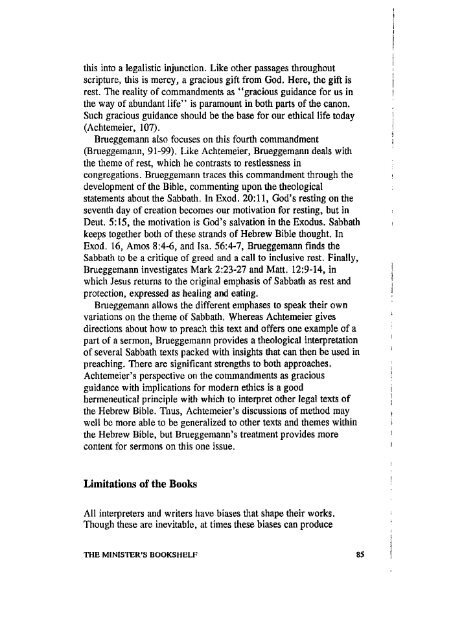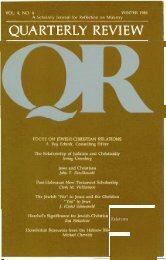TJieodore W. Jennings, Jr. The Meaning of ... - Quarterly Review
TJieodore W. Jennings, Jr. The Meaning of ... - Quarterly Review
TJieodore W. Jennings, Jr. The Meaning of ... - Quarterly Review
Create successful ePaper yourself
Turn your PDF publications into a flip-book with our unique Google optimized e-Paper software.
this into a legalistic injunction. Like other passages throughout<br />
scripture, this is mercy, a gracious gift from God. Here, the gift is<br />
rest. <strong>The</strong> reality <strong>of</strong> commandments as "gracious guidance for us in<br />
the way <strong>of</strong> abundant life" is paramount in both parts <strong>of</strong> the canon.<br />
Such gracious guidance should be the base for our ethical life today<br />
(Achtemeier, 107).<br />
Brueggemann also focuses on this fourth commandment<br />
(Brueggemann, 91-99). Like Achtemeier, Brueggemann deals with<br />
the theme <strong>of</strong> rest, which he contrasts to resdessness in<br />
congregations. Brueggemann traces this commandment through the<br />
development <strong>of</strong> the Bible, commenting upon the theological<br />
statements about the Sabbath. In Exod. 20:11, God's resting on the<br />
seventh day <strong>of</strong> creation becomes our motivation for resting, but in<br />
Deut. 5:15, the motivation is God's salvation in the Exodus. Sabbath<br />
keeps together both <strong>of</strong> these strands <strong>of</strong> Hebrew Bible thought. In<br />
Exod. 16, Amos 8:4-6, and Isa. 56:4-7, Brueggemann finds the<br />
Sabbath to be a critique <strong>of</strong> greed and a call to inclusive rest. Finally,<br />
Brueggemann investigates Mark 2:23-27 and Matt. 12:9-14, in<br />
which Jesus returns to the original emphasis <strong>of</strong> Sabbath as rest and<br />
protection, expressed as healing and eating.<br />
Brueggemann allows the different emphases to speak their own<br />
variations on the theme <strong>of</strong> Sabbath. Whereas Achtemeier gives<br />
directions about how to preach this text and <strong>of</strong>fers one example <strong>of</strong> a<br />
part <strong>of</strong> a sermon, Brueggemann provides a theological interpretation<br />
<strong>of</strong> several Sabbath texts packed with insights that can then be used in<br />
preaching. <strong>The</strong>re are significant strengths to both approaches.<br />
Achtemeier's perspective on the commandments as gracious<br />
guidance with implications for modern ethics is a good<br />
hermeneutical principle with which to interpret other legal texts <strong>of</strong><br />
the Hebrew Bible. Thus, Achtemeier's discussions <strong>of</strong> method may<br />
well be more able to be generalized to other texts and themes within<br />
the Hebrew Bible, but Brueggemann's treatment provides more<br />
content for sermons on this one issue.<br />
Limitations <strong>of</strong> the Books<br />
All interpreters and writers have biases that shape their works.<br />
Though these are inevitable, at times these biases can produce<br />
THE MINISTER'S BOOKSHELF 85












